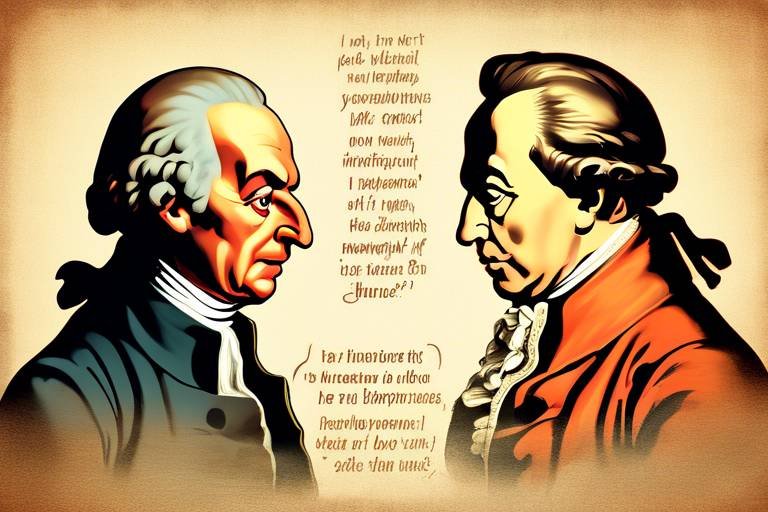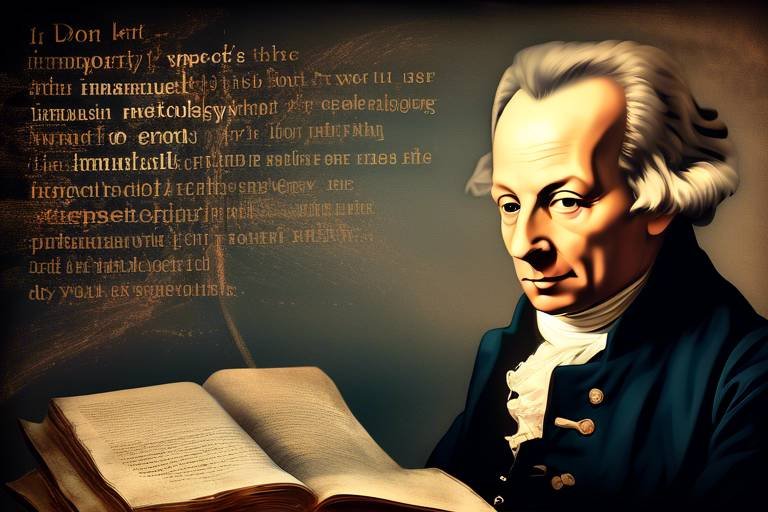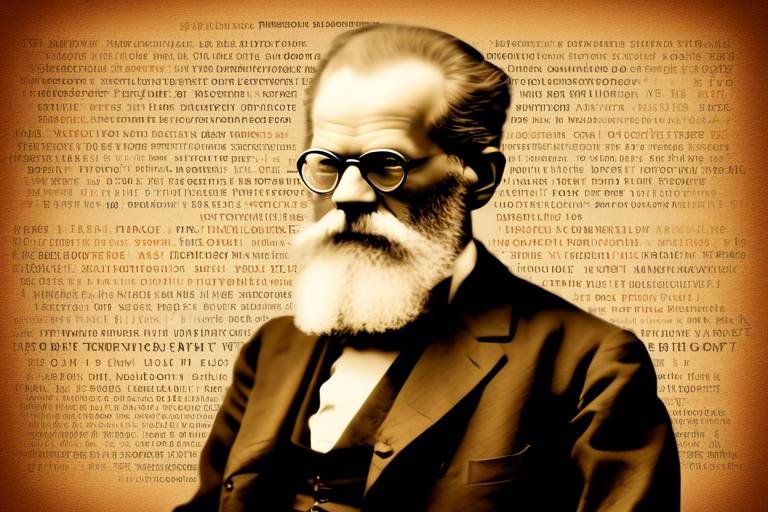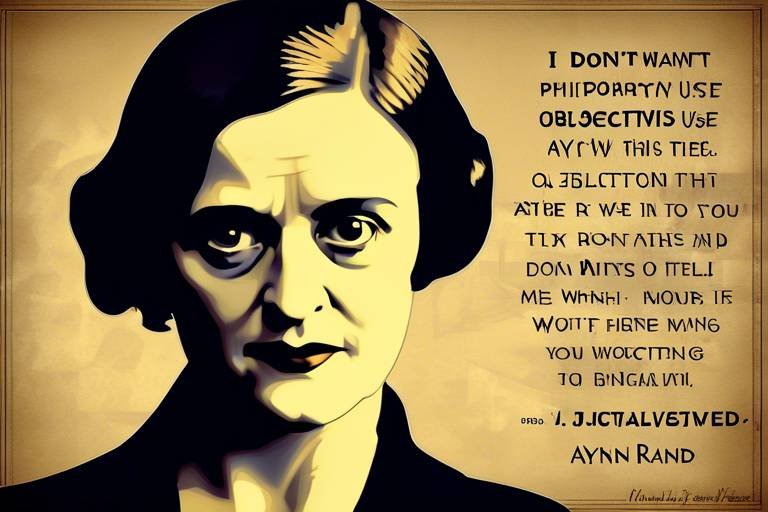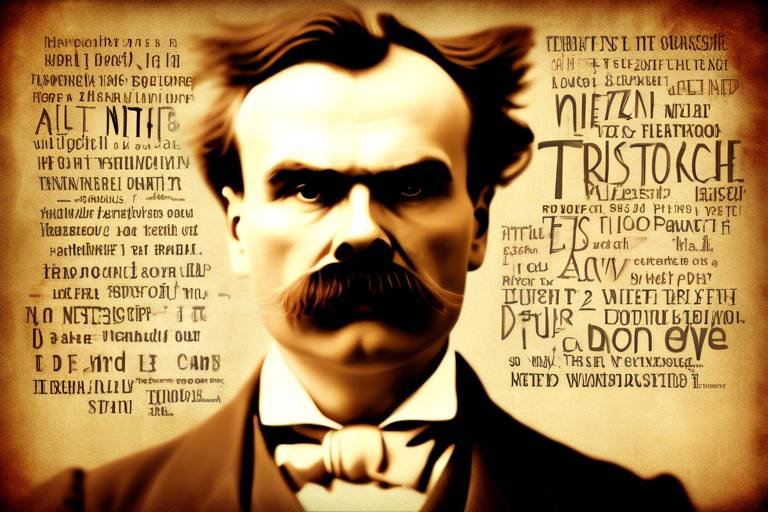Debating Philosophies - Kant vs. Hume
Welcome to a fascinating journey through the minds of two of the most influential philosophers in history: Immanuel Kant and David Hume. Their contrasting views on knowledge, ethics, and human understanding have shaped modern thought in profound ways. Imagine a world where the very foundation of what we believe to be true is questioned. That's exactly what these thinkers did! Kant, with his rigorous structure and emphasis on duty, challenges us to consider the universality of our actions, while Hume invites us to explore the unpredictable realm of human experience and emotion. This article will delve into their philosophies, highlighting their differences and the impact they have had on contemporary discussions.
Kant's approach to knowledge is nothing short of revolutionary. He argued that our understanding of the world is not merely a passive reflection of reality but is actively shaped by our own minds. According to Kant, we can only truly know phenomena—the things as they appear to us—while the noumena, or things in themselves, remain forever beyond our grasp. This leads to intriguing questions about the limits of human understanding. Are we just prisoners of our perceptions? Kant's theory invites us to ponder whether we can ever truly know anything outside our own experience. His assertion that knowledge is structured by our cognitive faculties raises the stakes for how we engage with the world around us.
On the flip side, we have Hume, who takes a more grounded approach to knowledge. His empiricism posits that all knowledge originates from our sensory experiences. Think about it: every time you touch, see, or hear something, you’re gathering raw data that forms the basis of your understanding. Hume challenges the traditional notions of causality and certainty, suggesting that what we often take for granted as objective knowledge is actually built on habits and patterns rather than rational deduction. This perspective leads to a kind of skepticism about the very foundations of our beliefs. Are we really as certain about our knowledge as we think? Hume's ideas compel us to question the reliability of our perceptions and the assumptions we make about the world.
In Kant's framework, reason plays a pivotal role in organizing sensory data into coherent knowledge. He believed that our rational capacities allow us to make sense of our experiences and form judgments about the world. In stark contrast, Hume viewed reason as a mere servant to our passions. He argued that human behavior and decision-making are largely influenced by our emotions rather than by cold, hard logic. This dichotomy raises essential questions: Is our understanding of the world primarily a product of rational thought, or are we driven more by our feelings than we realize? The interplay between reason and emotion is a central theme in the philosophical debate between these two giants.
When it comes to ethics, Kant’s philosophy is anchored in the concept of the Categorical Imperative. This principle commands individuals to act according to maxims that can be universally applied. Imagine a world where everyone follows the same moral laws—Kant believed this was essential for ethical behavior. He emphasized duty and moral law, arguing that our actions should be guided by what we ought to do, rather than what we want to do. This approach brings a sense of rigidity to moral philosophy, raising questions about the complexities of real-life ethical dilemmas. Can a strict adherence to duty always lead to the right decision?
Conversely, Hume proposed that morality arises from our human emotions and social interactions rather than from rationality. For him, moral judgments are rooted in feelings of approval or disapproval. This perspective challenges traditional notions of ethical reasoning, suggesting that our moral compass is not as objective as we might hope. Instead of relying solely on logic, Hume encourages us to consider the emotional underpinnings of our moral decisions. This raises an important question: Are our ethical standards truly universal, or are they shaped by our personal experiences and feelings?
The influence of Kant and Hume on contemporary philosophy cannot be overstated. Kant's ideas laid the groundwork for German Idealism, inspiring thinkers like Hegel and Fichte, while Hume's skepticism opened the door for later empiricists and pragmatists. Their contrasting views continue to shape discussions in both epistemology and ethics, inviting new generations of philosophers to explore the depths of human understanding and moral reasoning. The debate between these two thinkers is not just academic; it resonates in our daily lives as we navigate the complexities of knowledge and morality.
Despite his monumental contributions, Kant's philosophy has faced criticism for its perceived rigidity and idealism. Critics argue that his strict adherence to duty can lead to moral dilemmas where the application of the Categorical Imperative becomes problematic. For instance, how do we navigate situations where duties conflict? This rigidity can make Kant's ethical framework seem impractical in the messy reality of human life.
Defenders of Kant maintain that his framework provides a necessary foundation for moral philosophy. They argue that the Categorical Imperative allows for a consistent approach to ethics, even when faced with complex moral situations. By adhering to universal principles, Kant's philosophy strives to uphold a standard of morality that transcends individual circumstances, promoting a sense of justice and fairness.
Hume's skepticism and emphasis on sentiment have also drawn critique, particularly regarding their implications for the objectivity of moral judgments. Critics argue that his approach can lead to moral relativism, where ethical standards become subjective and variable. If morality is merely a reflection of our feelings, can we ever agree on what is right or wrong?
Supporters of Hume contend that his focus on human emotions enriches moral philosophy by grounding ethics in real human experiences. They argue that acknowledging emotional influences can lead to a more nuanced understanding of morality. Instead of viewing emotions as a hindrance to ethical reasoning, Hume's perspective invites us to embrace our humanity and recognize the complexities of moral decision-making.
- What is the main difference between Kant and Hume's philosophy? Kant emphasizes the role of reason and universal moral laws, while Hume focuses on emotions and sensory experiences as the basis of knowledge and morality.
- How did Kant influence modern philosophy? Kant's ideas laid the groundwork for subsequent philosophical movements, including German Idealism and existentialism, shaping discussions in ethics and epistemology.
- Is Hume's skepticism valid? Many scholars argue that Hume's skepticism is crucial for understanding the limits of human knowledge and the subjective nature of moral judgments.

Kant's Epistemology
Immanuel Kant's approach to epistemology is nothing short of revolutionary. He proposed that our understanding of the world is not merely a passive reception of sensory information, but rather an active construction shaped by the mind. This means that while we can grasp the world around us through our senses, what we truly know is filtered through our mental faculties. Kant famously distinguished between phenomena—the things we can experience—and noumena, which are things in themselves, existing independently of our perception. This distinction raises profound questions about the limits of human understanding. Are we ever truly able to know the noumena, or are we forever confined to our subjective experiences?
Kant argued that our knowledge is structured by innate categories of understanding, such as time, space, and causality. These categories allow us to organize sensory data into coherent experiences. For instance, when we see a ball rolling down a hill, our mind automatically applies the concept of causality, enabling us to understand that the ball's movement is a result of gravity. This process is not merely a passive observation; it's an active engagement of our cognitive faculties. Therefore, according to Kant, knowledge is not just about what we see but also about how our minds interpret and organize that information.
To illustrate Kant's perspective, consider the following table that summarizes his key ideas:
| Concept | Description |
|---|---|
| Phenomena | The world as we experience it, shaped by our perceptions. |
| Noumena | The reality that exists independent of our perceptions, which we cannot fully know. |
| Categories of Understanding | Innate concepts that structure our experiences, such as time and space. |
However, this leads to a critical inquiry: if our understanding is so heavily influenced by our mental frameworks, what does that say about the nature of reality? Kant's theory invites skepticism about the possibility of objective knowledge. Are we seeing the world as it truly is, or merely as our minds interpret it? In a way, Kant's philosophy acts like a lens, distorting our view of reality based on the shape and color of the glass through which we look. This notion can be both enlightening and troubling, as it suggests that our grasp of the world is inherently limited.
Moreover, Kant's insistence on the active role of the mind in shaping knowledge challenges the traditional empiricist view, which posits that knowledge is derived solely from sensory experience. By emphasizing the mind's role, Kant opens the door to a more complex understanding of knowledge that incorporates both sensory input and cognitive processing. This duality is essential for grasping the nuances of human understanding and has significant implications for various fields, from science to ethics.
In conclusion, Kant's epistemology not only reshapes our understanding of knowledge but also invites us to reflect on the very nature of reality itself. It compels us to consider whether our perceptions can ever truly mirror the world as it exists beyond our understanding. This philosophical inquiry is not just an academic exercise; it is a profound exploration of what it means to know and to be human.
- What is the difference between phenomena and noumena?
Phenomena are the things we can experience, while noumena are the things that exist independently of our perception. - How does Kant's epistemology differ from empiricism?
Kant emphasizes the active role of the mind in shaping knowledge, whereas empiricism focuses solely on sensory experience. - Why is Kant's philosophy considered revolutionary?
Kant's ideas challenge traditional notions of knowledge and reality, leading to new explorations in various philosophical fields.

Hume's Empiricism
David Hume, a towering figure in the realm of philosophy, presents a compelling view on how we acquire knowledge through his theory of empiricism. Unlike his contemporaries who emphasized rationalism, Hume boldly asserts that all knowledge originates from sensory experiences. Imagine your mind as a blank canvas; it's only through the strokes of experience that the vibrant colors of knowledge emerge. Hume argues that our understanding of the world is fundamentally shaped by what we perceive through our senses, leading him to question the very foundations of how we know what we know.
In Hume's view, the process of gaining knowledge is not a straightforward path paved by logic but rather a winding road filled with the bumps of uncertainty. He challenges the traditional notions of causality, suggesting that our belief in cause and effect stems not from rational deduction but from habit. For instance, when you see a ball rolling down a hill, you instinctively believe that it will continue to roll. But Hume would argue that this belief is not rooted in a logical certainty; instead, it’s a product of repeated observations. This leads to a fascinating conclusion: our understanding is often more about patterns and habits than absolute truths.
Hume's skepticism extends to the concept of objective knowledge. He posits that since our experiences are subjective, the conclusions we draw from them can also be inherently flawed. This realization can feel like a jolt to the system, akin to discovering that the ground beneath you is less stable than you thought. Hume's perspective encourages us to embrace a more flexible understanding of knowledge, one that acknowledges the limitations of human perception. This skepticism doesn’t render knowledge useless; rather, it invites a more nuanced approach to understanding the world.
To illustrate Hume's points, consider the following table that contrasts his empiricist views with traditional rationalist beliefs:
| Aspect | Hume's Empiricism | Rationalism |
|---|---|---|
| Source of Knowledge | Sensory Experience | Innate Ideas |
| Nature of Causality | Habitual Association | Logical Necessity |
| Objective Knowledge | Subjective Interpretation | Absolute Certainty |
Ultimately, Hume’s empiricism presents a radical shift in understanding human knowledge. By emphasizing the role of experience and challenging the reliability of reason as the sole arbiter of truth, he opens the door to a more dynamic and flexible approach to knowledge. This perspective is especially relevant in today’s world, where information is abundant but certainty is often elusive. Hume's insights remind us that being open to questioning our beliefs can lead to a richer and more profound understanding of reality.
- What is Hume's main argument in his theory of empiricism?
Hume argues that all knowledge originates from sensory experiences and that our understanding is shaped by what we perceive.
- How does Hume's view on causality differ from traditional beliefs?
Hume suggests that causality is based on habitual associations rather than logical necessity, challenging the traditional view that causation is a given.
- What is the significance of Hume's skepticism?
His skepticism encourages a more flexible understanding of knowledge, acknowledging the limitations of human perception and the subjectivity of our experiences.

The Role of Reason
When diving into the philosophical ocean of Immanuel Kant and David Hume, one cannot overlook the pivotal role of reason. Kant, a staunch advocate for the power of the mind, believed that our understanding of the world is not merely a passive reception of sensory information. Instead, he argued that reason actively shapes our experiences, organizing the chaotic data from our senses into coherent knowledge. Imagine trying to assemble a jigsaw puzzle without the picture on the box; that’s what Kant thought sensory data would be without the guiding hand of reason.
Kant's framework posits that while we can grasp the phenomena—the things as they appear to us—there exists a realm of noumena—the things in themselves—that remains elusive. This distinction raises profound questions about the limits of human understanding. Can we ever truly know reality, or are we forever bound to our subjective interpretations? This is where Kant’s philosophy begins to challenge our intuitive beliefs about knowledge and reality.
On the flip side, we have Hume, who takes a markedly different stance. He considers reason as a servant to our passions, rather than a master. For Hume, our understanding is deeply rooted in habit and experience. He argues that while we may think we are guided by reason, it is often our emotions and desires that dictate our actions. This perspective leads to a more skeptical view of objective knowledge. For Hume, the notion of causality is not a rational deduction but a habit formed through repeated experiences. When we see one event follow another, we come to expect it, but is that expectation grounded in reason or merely in our past experiences?
To illustrate the contrast between Kant and Hume regarding the role of reason, consider the following table:
| Aspect | Kant | Hume |
|---|---|---|
| Nature of Reason | Active organizer of sensory data | Servant of emotions and passions |
| Understanding of Knowledge | Phenomena vs. Noumena | Grounded in habit and experience |
| View on Causality | Rational deduction | Habitual expectation |
In essence, the role of reason in Kant’s philosophy is a noble knight, valiantly striving to conquer the chaos of sensory experiences, while in Hume’s view, it’s more of a loyal squire, dutifully following the emotional whims of human nature. This dichotomy not only highlights the contrasting views of these two philosophical giants but also invites us to reflect on our own understanding of knowledge and the forces that shape it. Are we guided by our rational minds, or do our emotions steer the ship of our understanding? The exploration of this question continues to resonate in modern philosophical discourse, making the examination of reason's role ever more relevant.

Kant's Categorical Imperative
Immanuel Kant's ethical philosophy centers around the concept of the Categorical Imperative, which serves as a foundational principle for determining moral actions. Unlike hypothetical imperatives that are conditional and based on personal desires, the Categorical Imperative is an unconditional command that applies universally, regardless of individual circumstances or outcomes. Kant believed that moral actions should be guided by maxims that can be consistently willed as universal laws. This means that before acting, one should ask, "Would it be acceptable for everyone to act in this way?" If the answer is no, then the action is deemed immoral.
Kant's Categorical Imperative can be broken down into three key formulations that illustrate its application in ethical decision-making:
- The Formula of Universal Law: Act only according to that maxim whereby you can, at the same time, will that it should become a universal law.
- The Formula of Humanity: Act in such a way that you treat humanity, whether in your own person or in the person of any other, always at the same time as an end and never merely as a means to an end.
- The Formula of Autonomy: Act only so that your will can regard itself at the same time as making universal law through its maxims.
These formulations emphasize the importance of rationality and respect for individuals as moral agents. Kant argues that moral obligations are derived from reason, and individuals possess the autonomy to make ethical choices. This perspective elevates the role of duty and moral law, suggesting that true morality is not contingent on personal inclinations or societal norms but rather on adherence to these universal principles. However, applying the Categorical Imperative can lead to complex moral dilemmas, especially when maxims conflict or when real-world situations don't fit neatly into Kant's framework.
Despite the challenges in application, Kant’s Categorical Imperative remains a crucial element in the discourse of ethics, prompting ongoing debates about the nature of morality, the role of reason, and the importance of duty. It encourages individuals to think critically about their actions and the broader implications of those actions on society as a whole. In a world filled with ethical gray areas, the Categorical Imperative serves as a beacon, guiding moral reasoning towards a more principled approach to human conduct.
- What is the Categorical Imperative? The Categorical Imperative is a central philosophical concept in Kant's ethics, serving as a universal principle for determining moral actions.
- How does the Categorical Imperative differ from hypothetical imperatives? Unlike hypothetical imperatives, which are conditional and based on personal desires, the Categorical Imperative is unconditional and applies universally.
- Why is the Categorical Imperative important? It provides a framework for evaluating the morality of actions based on reason and duty, rather than personal feelings or societal norms.
- Can the Categorical Imperative lead to moral dilemmas? Yes, applying the Categorical Imperative can lead to complex situations where maxims conflict or do not fit neatly into the framework.

Hume's Moral Sentiment
David Hume, a towering figure in the realm of philosophy, presents a compelling argument regarding the foundation of morality. Contrary to the traditional view that morality is rooted in rational thought, Hume posits that our ethical judgments stem primarily from human emotions and social interactions. This perspective not only challenges established norms but also invites us to reconsider how we perceive moral actions and decisions.
Hume argues that moral sentiments, or feelings of approval and disapproval, are the bedrock of our ethical framework. He suggests that when we witness an action, our immediate emotional response—whether it be admiration, disgust, or indifference—shapes our moral judgment. For Hume, this is a natural process, as our feelings are inherently tied to our experiences and interactions with others. Thus, morality becomes a reflection of our human nature, rather than a set of rigid, abstract principles.
To illustrate Hume's view, consider the following scenario: when a person acts altruistically, we often feel a sense of approval and warmth towards them. This emotional reaction, according to Hume, is what leads us to label their action as "good." Conversely, when someone commits an act of cruelty, our feelings of disapproval arise, prompting us to deem that behavior as "bad." In this way, emotions serve as the guiding force behind our ethical evaluations.
Moreover, Hume emphasizes the importance of sympathy—the ability to share and understand the feelings of others. He believes that our capacity for empathy allows us to connect with people on a deeper level, fostering a sense of moral obligation towards one another. This sentiment is not merely a personal feeling but is shaped by societal norms and collective experiences. In essence, our moral compass is calibrated by the emotional responses we share within our communities.
However, Hume's approach has not been without criticism. Detractors argue that grounding morality in sentiment can lead to moral relativism, where ethical standards fluctuate based on individual feelings rather than objective truths. This raises important questions: If morality is solely based on emotions, can it be universally applied? How do we reconcile differing sentiments across cultures and societies?
Despite these critiques, Hume's emphasis on the role of emotions in moral reasoning enriches our understanding of ethics. By acknowledging the influence of feelings, we can cultivate a more nuanced and compassionate approach to moral dilemmas. Hume's moral sentiment theory invites us to engage with ethics as a dynamic interplay of emotions, rather than a static set of rules.
- What is Hume's main argument about morality?
Hume argues that morality arises from human emotions and social interactions, rather than rational deduction. - How does Hume's view differ from Kant's?
Kant believes in a rational basis for morality, while Hume emphasizes feelings and sentiments as the foundation for ethical judgments. - Can Hume's moral sentiment lead to moral relativism?
Yes, critics argue that grounding morality in emotions may lead to subjective and variable ethical standards. - What role does sympathy play in Hume's moral philosophy?
Sympathy is crucial as it allows individuals to connect emotionally with others, shaping their moral obligations and judgments.

Impact on Modern Philosophy
The philosophical contributions of Immanuel Kant and David Hume have left a profound mark on the landscape of modern thought. Their contrasting views on knowledge, ethics, and human understanding have not only shaped philosophical discourse but also influenced various fields such as psychology, political theory, and even the natural sciences. Kant’s rigorous approach to epistemology and ethics has led to the emergence of German Idealism, inspiring thinkers like Georg Wilhelm Friedrich Hegel and Friedrich Nietzsche, who expanded upon his ideas and challenged existing paradigms. On the other hand, Hume's skepticism and emphasis on empirical observation paved the way for later empiricists, such as John Stuart Mill, and pragmatists like William James, who sought to ground philosophical inquiry in human experience and practical consequences.
Moreover, Kant's notion of the categorical imperative has become a cornerstone in discussions of moral philosophy, emphasizing that ethical principles should be universally applicable. This idea has influenced contemporary debates about human rights and justice, as it advocates for a moral framework that transcends cultural and individual differences. In contrast, Hume’s focus on moral sentiments has encouraged a more subjective understanding of ethics, suggesting that our moral judgments are deeply intertwined with our feelings and social contexts. This perspective has led to a richer exploration of the role of emotions in moral decision-making and has been pivotal in the development of social psychology.
Both philosophers have also contributed to the discourse on human understanding. Kant’s belief in the active role of the mind in shaping experiences has sparked discussions about the nature of perception and reality, influencing fields like cognitive science and phenomenology. Hume’s empiricism, with its emphasis on sensory experience, has encouraged a more scientific approach to understanding human behavior, laying the groundwork for the scientific method in psychology and social sciences.
| Philosopher | Key Contributions | Influence on Modern Thought |
|---|---|---|
| Kant | Categorical Imperative, Epistemology | German Idealism, Human Rights |
| Hume | Empiricism, Moral Sentiments | Pragmatism, Social Psychology |
In summary, the intellectual legacies of Kant and Hume continue to resonate in various academic and practical realms today. Their contrasting philosophies invite ongoing dialogue, challenging us to reflect on the nature of knowledge and morality in our ever-evolving world. As we navigate complex ethical dilemmas and seek to understand the human experience, the insights provided by these two giants of philosophy remain invaluable.
- What is the main difference between Kant and Hume's philosophy?
Kant emphasizes the role of the mind in shaping experiences and believes in universal moral laws, while Hume focuses on sensory experiences and emotions as the basis of knowledge and morality.
- How did Kant influence modern ethics?
Kant’s categorical imperative has become a fundamental principle in discussions of ethics, advocating for actions that can be universally accepted as moral.
- Why is Hume considered a skeptic?
Hume questioned the certainty of knowledge and causality, arguing that our understanding is based more on habit and experience than on rational deduction.

Critiques of Kant
Kant's philosophical framework, while groundbreaking, has not escaped criticism. One of the primary critiques revolves around the perceived rigidity of his moral system. Critics argue that Kant's strict adherence to the Categorical Imperative can lead to complex moral dilemmas. For instance, consider the scenario where telling the truth could result in harm to another individual. Kant would insist on honesty, adhering to the principle that one should always tell the truth, but this can lead to ethical conflicts that challenge the practicality of his theory.
Moreover, some philosophers contend that Kant's idealism overlooks the nuances of real-world situations. Critics suggest that his approach is too abstract and does not adequately account for the emotional and situational factors that influence human behavior. This perspective raises questions about whether moral laws can truly be universal, as Kant proposed, or if they must be adaptable to the complexities of human life.
Another significant critique of Kant's philosophy is the argument that his framework can lead to a form of moral absolutism. By insisting that certain actions are categorically right or wrong, regardless of context, critics fear that this could result in a lack of compassion or understanding in moral decision-making. They argue that this rigidity can create a disconnect between ethical theory and the lived experiences of individuals.
Furthermore, Kant's reliance on reason as the primary source of moral law has been challenged. Critics argue that this emphasis on rationality can neglect the role of emotions and social context in shaping moral judgments. To illustrate this point, consider the following table, which contrasts Kant's rational approach with a more emotion-based perspective:
| Aspect | Kant's Rational Approach | Emotion-Based Perspective |
|---|---|---|
| Source of Morality | Universal Reason | Human Emotions |
| Flexibility | Rigid, Absolute | Adaptive, Contextual |
| Moral Decision-Making | Based on Duty | Based on Feelings |
In summary, while Kant's contributions to moral philosophy are undeniably significant, they invite a range of critiques that highlight potential shortcomings. The tension between his abstract principles and the complexities of human experience continues to fuel debate among philosophers today.
- What is the Categorical Imperative?
The Categorical Imperative is a central concept in Kant's ethical theory, asserting that one should act only according to maxims that can be universally applied. - Why do critics argue against Kant's rigidity?
Critics believe that Kant's strict adherence to duty can lead to moral dilemmas and does not account for the complexities of real-life situations. - How does Kant's philosophy differ from Hume's?
Kant emphasizes reason and universal laws in moral philosophy, while Hume focuses on emotions and social interactions as the basis for moral judgments.

Responses to Critiques
In the face of criticism, defenders of Kant's philosophy argue that his ethical framework provides a robust and necessary foundation for moral philosophy. They emphasize that the Categorical Imperative is not merely a rigid rule but a guiding principle that encourages individuals to consider the universality of their actions. By acting according to maxims that can be universally applied, individuals are compelled to reflect on the broader implications of their choices, fostering a sense of moral responsibility.
Moreover, Kant's followers assert that his philosophy is not devoid of flexibility. They argue that the Categorical Imperative, while strict in its formulation, allows for a nuanced approach to ethical dilemmas. For instance, when faced with conflicting duties, Kantian ethics encourages individuals to engage in a thoughtful deliberation process to determine which maxim holds greater moral weight in a given situation. This process, they claim, is essential for navigating the complexities of real-life ethical challenges.
Supporters of Kant also highlight the importance of reason in moral decision-making. They argue that reason serves as a critical tool that enables individuals to rise above subjective desires and emotional impulses, guiding them toward rational and ethical behavior. This perspective posits that by adhering to reason, individuals can achieve a higher moral standard that transcends personal biases and societal pressures.
In summary, while critics may point to the rigidity of Kant's ethical framework, his defenders maintain that the Categorical Imperative provides a consistent and rational approach to morality. They believe that this structure is essential for fostering ethical behavior in a complex world, allowing individuals to navigate moral dilemmas with clarity and purpose.
- What is the Categorical Imperative?
The Categorical Imperative is a central concept in Kant's moral philosophy, which states that one should act only according to that maxim which one can will to become a universal law.
- How does Hume's view of morality differ from Kant's?
Hume believes that morality is derived from human emotions and social interactions, while Kant argues that it is grounded in rationality and universal principles.
- What are the main criticisms of Kant's philosophy?
Critics argue that Kant's strict adherence to duty can lead to moral dilemmas, where the application of the Categorical Imperative becomes problematic in real-life situations.
- Why is Hume's skepticism considered important?
Hume's skepticism challenges the notion of objective knowledge, emphasizing that human understanding is often based on habit and experience rather than rational deduction.

Critiques of Hume
David Hume's philosophy, particularly his skepticism and emphasis on sentiment, has not been without its share of critiques. Many philosophers and scholars argue that Hume's approach undermines the objectivity of moral judgments. By placing such heavy reliance on emotions and subjective experiences, critics contend that Hume opens the door to moral relativism. This is the idea that ethical standards can vary significantly from one individual or culture to another, leading to a situation where no single moral framework can claim universal validity.
For instance, consider the implications of Hume's assertion that our moral judgments are primarily influenced by feelings of approval or disapproval. Critics argue that if morality is rooted in personal sentiment, it becomes challenging to establish any common ground for ethical discussions. In a world where moral opinions are as diverse as the individuals who hold them, how can we reach consensus on issues that deeply affect society? This leads to a slippery slope where actions that might be deemed unethical by one person could be justified by another based solely on their feelings.
Moreover, Hume's skepticism regarding causality raises further concerns. By suggesting that our understanding of cause and effect is merely a product of habit rather than rational deduction, he invites questions about the very foundation of scientific inquiry and reasoned argumentation. If we cannot trust our causal inferences, how do we build knowledge? Critics argue that this skepticism could lead to an intellectual paralysis, where individuals become reluctant to make decisions based on evidence and reason.
To illustrate some of these critiques, consider the following table that summarizes key points of contention regarding Hume's philosophy:
| Critique | Description |
|---|---|
| Moral Relativism | Hume's focus on sentiment may lead to the belief that moral truths are subjective and vary across cultures. |
| Undermining Objectivity | By grounding morality in emotions, Hume's philosophy is seen as lacking a universal standard for ethical judgments. |
| Skepticism of Causality | Hume's views on causality challenge the reliability of our understanding of cause and effect, questioning the basis of scientific reasoning. |
Despite these critiques, it's essential to recognize that Hume's emphasis on human emotions and social interactions has also enriched moral philosophy. Supporters argue that acknowledging the emotional aspects of morality can lead to a more nuanced understanding of ethical behavior. They contend that this approach allows for a richer exploration of how humans actually make moral decisions in real-life scenarios, rather than relying solely on abstract principles.
In conclusion, while Hume's philosophy has faced substantial criticism, it has also sparked vital discussions about the nature of morality and knowledge. The debates surrounding his ideas continue to influence contemporary thought, prompting philosophers to grapple with the complexities of human understanding and ethical behavior.
- What is the main critique of Hume's moral philosophy?
Many critics argue that Hume's reliance on sentiment undermines the objectivity of moral judgments, leading to moral relativism. - How does Hume's skepticism affect scientific reasoning?
Hume's skepticism about causality raises questions about the reliability of our understanding of cause and effect, which is foundational to scientific inquiry. - What are some positive aspects of Hume's philosophy?
Supporters of Hume argue that his focus on emotions provides a more nuanced understanding of morality, reflecting how people actually make ethical decisions.

Responses to Critiques
Despite the criticisms leveled against Kant's philosophy, many of his defenders argue that his framework offers a solid foundation for moral philosophy. They assert that the Categorical Imperative is not merely a rigid rule but rather a guiding principle that allows for a consistent approach to ethics. This consistency is particularly valuable in a world where moral dilemmas often arise, forcing individuals to navigate complex situations. Kant's emphasis on duty and universalizability can provide clarity when faced with conflicting moral obligations.
For instance, consider a situation where one must choose between telling a painful truth or a comforting lie. Kantian ethics would compel one to consider whether the maxim of lying could be universalized without contradiction. This process encourages individuals to think critically about their actions and their implications for society as a whole.
Moreover, Kant's defenders argue that his philosophy promotes a sense of moral responsibility. By adhering to the Categorical Imperative, individuals are encouraged to act out of duty rather than mere inclination. This perspective fosters a sense of integrity and accountability, which can be crucial in maintaining ethical standards within society.
Critics may argue that Kant's strict adherence to duty can lead to moral dilemmas, but supporters counter that these dilemmas highlight the importance of ethical principles in guiding behavior. They suggest that rather than viewing these situations as failures of Kant's philosophy, they should be seen as opportunities to engage deeply with moral reasoning.
In summary, while Kant’s philosophy has its challenges, its proponents maintain that it provides a necessary and robust framework for ethical decision-making. By focusing on duty and the universality of moral laws, Kant's approach encourages individuals to consider the broader implications of their actions, ultimately contributing to a more ethical society.
- What is the Categorical Imperative?
The Categorical Imperative is a central concept in Kant's ethical theory, which posits that one should act only according to maxims that could be willed as universal laws. - How does Hume's empiricism differ from Kant's epistemology?
Hume's empiricism emphasizes sensory experience as the source of knowledge, while Kant argues that the mind plays a crucial role in shaping our understanding of experiences. - What are the implications of Kant's philosophy on modern ethics?
Kant's emphasis on duty and moral law has influenced contemporary discussions on human rights and justice, promoting a framework that values universal ethical standards. - Can Hume's skepticism lead to moral relativism?
Yes, critics argue that Hume's focus on emotions can result in subjective moral standards, leading to the potential for moral relativism.
Frequently Asked Questions
- What are the main differences between Kant and Hume's philosophies?
Kant emphasizes the role of the mind in shaping experiences and believes in the existence of noumena, which are beyond human understanding. In contrast, Hume argues that knowledge comes from sensory experiences and suggests that our understanding is based on habits rather than rational thought.
- How does Kant's Categorical Imperative work?
Kant's Categorical Imperative is a foundational concept in his ethical theory. It asserts that one should act only according to maxims that can be universally applied. This principle emphasizes duty and moral law, guiding individuals to make ethical decisions based on reason rather than personal inclinations.
- Why is Hume's approach considered skeptical?
Hume's skepticism arises from his belief that human understanding is limited and that knowledge is not derived from rational deduction but rather from experiences and emotions. He challenges the certainty of causality, suggesting that our beliefs are often based on habit rather than objective reasoning.
- What critiques have been made against Kant's philosophy?
Kant's philosophy has been criticized for its rigidity and the potential for moral dilemmas when applying the Categorical Imperative. Critics argue that strict adherence to duty can lead to situations where moral choices become complex and challenging to navigate.
- How do defenders of Hume respond to critiques of moral relativism?
Supporters of Hume argue that his focus on human emotions enriches our understanding of morality. They believe that grounding ethics in real human experiences allows for a more nuanced perspective, acknowledging that emotions play a significant role in moral judgments.
- In what ways have Kant and Hume influenced modern philosophy?
Kant's ideas laid the groundwork for German Idealism and have influenced various fields, including metaphysics and epistemology. Hume's skepticism and emphasis on empiricism have paved the way for later thinkers, shaping discussions in ethics and the philosophy of science.

